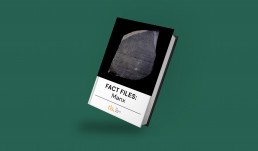Rare language fact file: Ladino
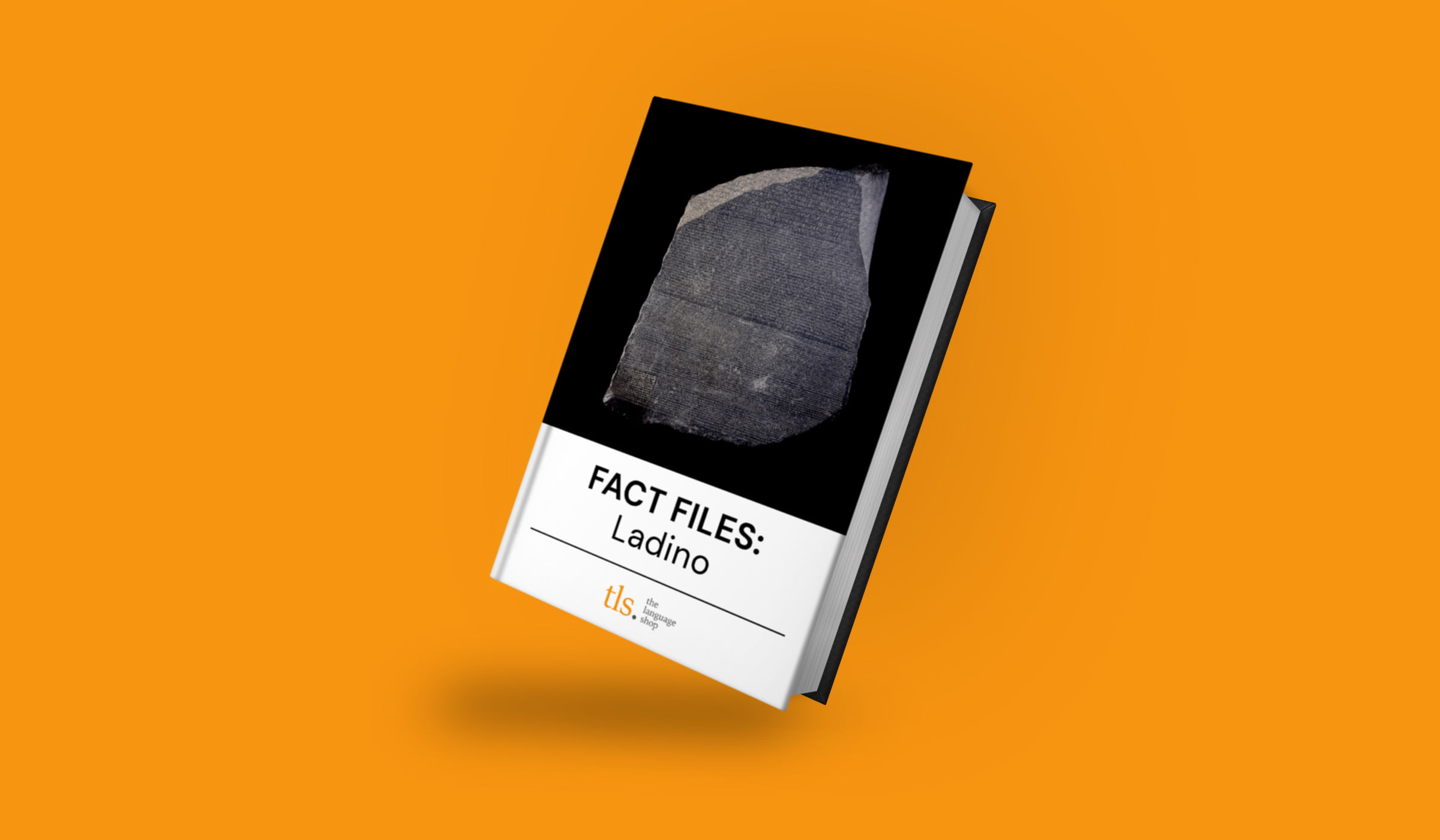
At The Language Shop we like to shine a light on some of the rarer languages spoken across the world, many of which have long and fascinating histories. This month we take a closer look at Ladino.
Native to: Europe, but predominantly spoken in Israel
Number of native speakers: Less than 60,000
Spoken by: Some groups of Sephardic Jews
Learn some Ladino: If someone sneezes, the Ladino way to respond is a bit longer than the English. They say: “Bivas, kreskas, engrandeskas, komo un peshiko en aguas freskas! Amen!”
Interesting facts:
- In 1492, Jews living in Spain were forced to either convert to Catholicism or leave. Many fled elsewhere, blending their own language of Old Spanish with Hebrew and the languages of the countries where they settled. The language that evolved was called Judeo-Spanish Ladino. Because the Spanish Jews fled to many different countries, Ladino has a large variety of dialects.
- Ladino has struggled to survive, in part because the community was fractured and its people eventually adopted the various languages of the countries they settled in. In addition to this, the first waves of Jewish diaspora in the US were from mostly Germany and Eastern Europe, and Yiddish became the language of the Jewish community there. There is now a movement to revive the language, driven by Sephardic Jews in the US.
- Ladino was immortalised by Hollywood in the 1986 film, Every Time We Say Goodbye, starring Tom Hanks. In the film, Tom Hanks’ character, a gentile, falls in love with a Sephardic Jewish girl, whose family speaks Ladino.
The Language Shop provides support in any language you may need, including many of the rarer ones. Get in touch with us to find out more.
Keep up to date with all our latest news here and on social media – we are on Facebook, Twitter and LinkedIn.
Celebrations around the world: Ramadan, 2nd April - 1st May

The Language Shop explores the festivals and events celebrated by different cultures around the world. This month we look at Ramadan, which takes place from 2nd April to 1st May, depending on lunar sighting.
What: The Islamic holy month of fasting, abstention, prayer and charity.
Why: It was during this month that the Islamic holy book, the Qur’an, was revealed to the Prophet Muhammed. Muslims fast and abstain from impure thoughts and behaviour during this sacred time to bring themselves closer to God. Going without food and drink during the day also reminds Muslims of the suffering of others in the world. Fasting during Ramadan is known as Sawm, and is one of the five pillars of Islam.
How: In addition to fasting and abstention between sunset and sunrise, Muslims attend special services at their mosque, and many attempt to read the entire Qur’an over the course of the month. Zakat, or giving to charity, is another pillar of Islam, so it is always important to Muslims. However, during Ramadan, it takes on even more importance. Eid al-Fitr marks the end of the month with a two to three day celebration, involving lots of eating, drinking and dressing in your best clothes.
If you are observing Ramadan, we would love to hear about it. Please email nicole.kershaw@newham.gov.uk
Keep up to date with all our latest news here and on social media – we are on Facebook, Twitter and LinkedIn.
Meet The Team: Stephanie Bright, Resource and Compliance Manager

Every month, we introduce you to one of our team. This month, meet Stephanie Bright, The Language Shop's Resource and Compliance Manager.
Tell us about what you do for TLS
I am responsible for all recruitment, engagement and associated compliance that has to be considered when recruiting into The Language Shop. Additionally, I am here to support internal teams, employees and our freelance interpreters who do amazing work, day in and day out.
What’s been your favourite project at TLS?
Because my role is so varied it's difficult to pinpoint one specific project. My projects can be recruiting freelance interpreters, enhancing internal teams, conducting feedback reviews or helping out in a team if they are short staffed. This is what I love: each day is different but completely people-focused, which is embedded within TLS.
What’s been the biggest challenge?
External influences can impact my role and responsibilities quite quickly so it is important to stay ahead as much as possible and to be aware of such factors all the time.
If you didn’t do your current job, what would you like to do?
I always wanted to be a nurse. It would have to be a role where I could make a difference like I do in my current role with TLS.
Tell us something interesting about you
I am a mum to a 10 year old boy and in my spare time enjoy the outdoors.
If you could meet anyone, living or dead, who would it be and why?
My grandma, unfortunately she never met my son, so would love that and to also enjoy her Yorkshire puddings again. She made them like pancakes and they were the best!
What are your ambitions for 2022?
To continue being a valued asset and team member to TLS. As the business grows, I am constantly learning new skills and experiences.
Say hello to Stephanie on The Language Shop’s social media – we are on Facebook, Twitter and LinkedIn. Keep up to date with all our latest news here.
Rare language fact file: Manx
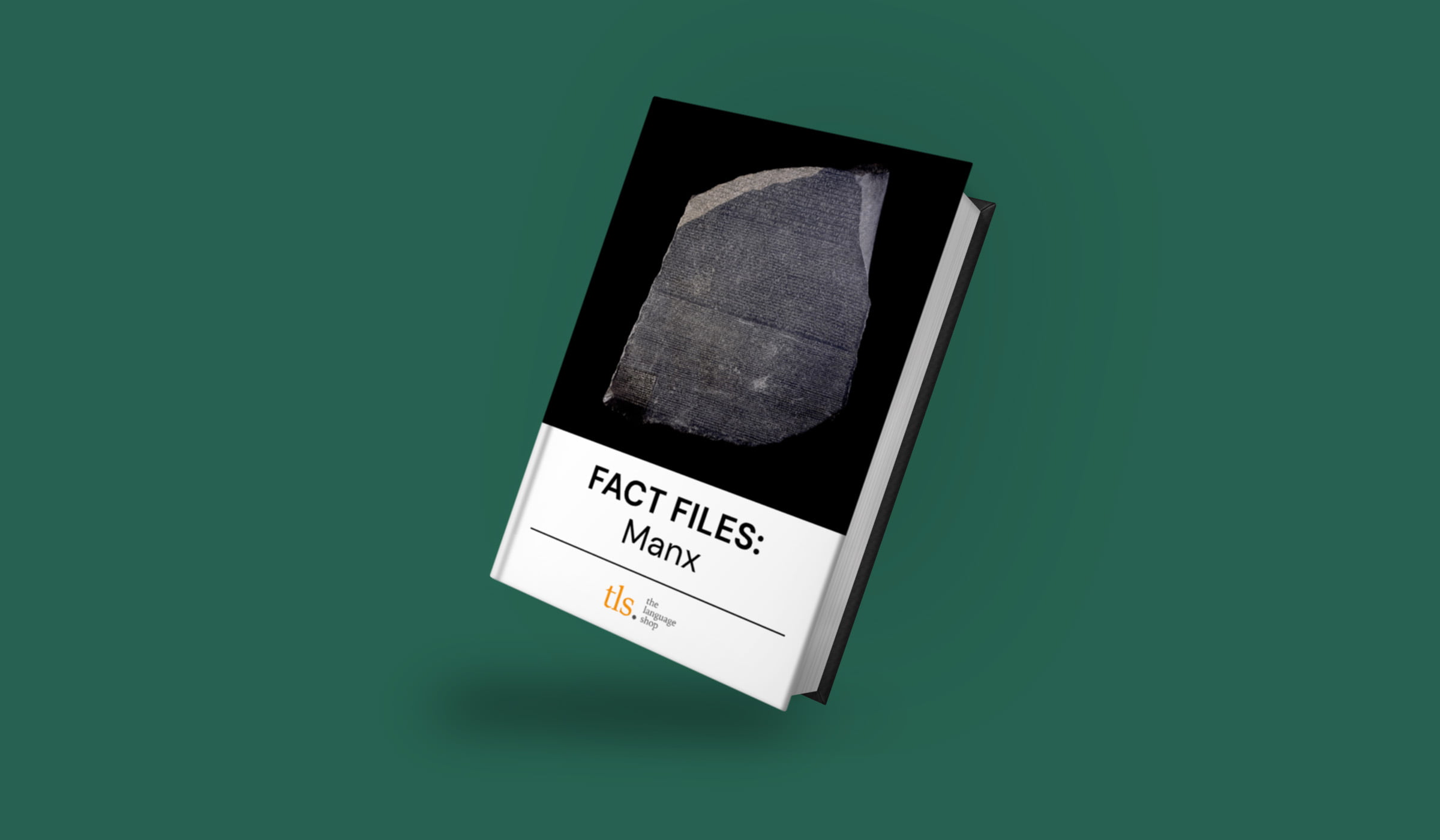
Here at The Language Shop we like to shine a light on some of the rarer languages spoken across the world, many of which have long and fascinating histories. This month we take a closer look at Manx.
Native to: Isle of Man, UK
Number of native speakers: 53 (first language)
Spoken by: The Manx people
Learn some Manx: Greet people by saying ‘moghrey mie’. If they say ‘Kys t’ou?’ they are asking how you are. You can reply to with, ‘Mie dy liooar’, which means ‘well enough’.
Interesting facts:
- Manx was officially declared extinct in 2009. However, thanks to efforts to revive it, it has now been promoted to critically endangered.
- Although the Isle of Man is only 33 miles long and 13 miles wide, Manx actually has two dialects, one from the north and one from the south of the island. The variation spoken in the centrally located capital, Douglas, is considered to be the standard.
- The language became less and less popular in the early 20th century because people associated it with poverty. Many Manx people opted for English instead, and there was a popular Manx saying: “Cha jean oo cosney ping lesh y Ghailck”, meaning: “You will not earn a penny with Manx.”
The Language Shop provides support in any language you may need, including many of the rarer ones. Get in touch with us to find out more.
Keep up to date with all our latest news here and on social media – we are on Facebook, Twitter and LinkedIn.
Celebrations around the world: Purim, 16-17 March

TLS delves deeper into the festivals and events celebrated by different cultures around the world. This month we look at Purim on 16th and 17th March.
What: Purim is a Jewish festival that falls on the 14th of the Hebrew month of Adar. In 2022, it will last from the evening of 16th March through to the evening of 17th.
Why: In the 4th century BC, the Persian Empire ruled over all the Jews. Its king married a woman named Esther, who was Jewish but kept this fact hidden from the king. A Jew-hating man named Haman had been appointed prime minister.
When Esther’s cousin, Mordechai, refused to bow to the prime minister, Haman drew lots (this is what gives Purim its name) to decide the on which date he would annihilate all Jews: the 13th of Adar. While Mordechai gathered support from other Jews, Esther held a banquet where she revealed her Jewish identity to her husband.
Haman was subsequently hanged, and on the 13th Adar, Jews fought their enemies and were victorious. On the 14th, they celebrated.
How: Purim is known as the wildest and most fun of all Jewish celebrations. Children (and some adults) put on fancy dress, people give money to the poor and gifts (traditionally two kinds of food) to each other and loved ones meet to share a Purim feast.
If you are celebrating Purim, we would love to hear about it. Please email nicole.kershaw@newham.gov.uk
Keep up to date with all our latest news here and on social media – we are on Facebook, Twitter and LinkedIn.
Meet The Team: Sumayyah Aleem, Punjabi and Urdu interpreter

Every month, we introduce you to one of The Language Shop team. This month, meet Sumayyah Aleem, one of our Punjabi and Urdu interpreters. Find out about her passion for helping people and how gardening helps her to relax.
Tell us about what you do for TLS
I have been providing face to face and virtual interpreting services for The Language Shop. My responsibilities include converting information from the source language into the target language, carefully communicating spoken messages with efficiency, clarity and sensitivity.
What’s been your favourite project at TLS?
I have worked on many projects so far, some of the projects I have been working on are still on going. It is difficult to choose one particular project, however I felt very satisfied and happy when a broken family was reunited. The young children were back together from the foster care.
What’s been the biggest challenge?
Home visits can sometimes be challenging, as patients can occasionally become aggressive towards the professionals; the challenge is to remain calm before leaving the premises.
If you didn’t do your current job, what would you like to do?
I would wish to continue to work in a setting where I am providing help and supporting people, in an educational or medical setting.
Tell us something interesting about you
In my spare time, I grow my own flowers, plants and tea leaves. I find that the process of gardening is quite meditative for me and I believe that it helps me feel more centred during interpreting sessions.
If you could meet anyone, living or dead, who would it be and why?
I would have loved to have met either Mother Teresa or Princess Diana. Like many people, I felt a strange connection to them. They radiated warmth and humility, and both were such great humanitarians.
What are your ambitions for 2022?
My strong desire and aspiration is to learn another language this year, which should develop my communication skills and contribute to The Language Shop.
Say hello to Jacky on The Language Shop’s social media – we are on Facebook, Twitter and LinkedIn. Keep up to date with all our latest news here.
Rare language fact file: Mang
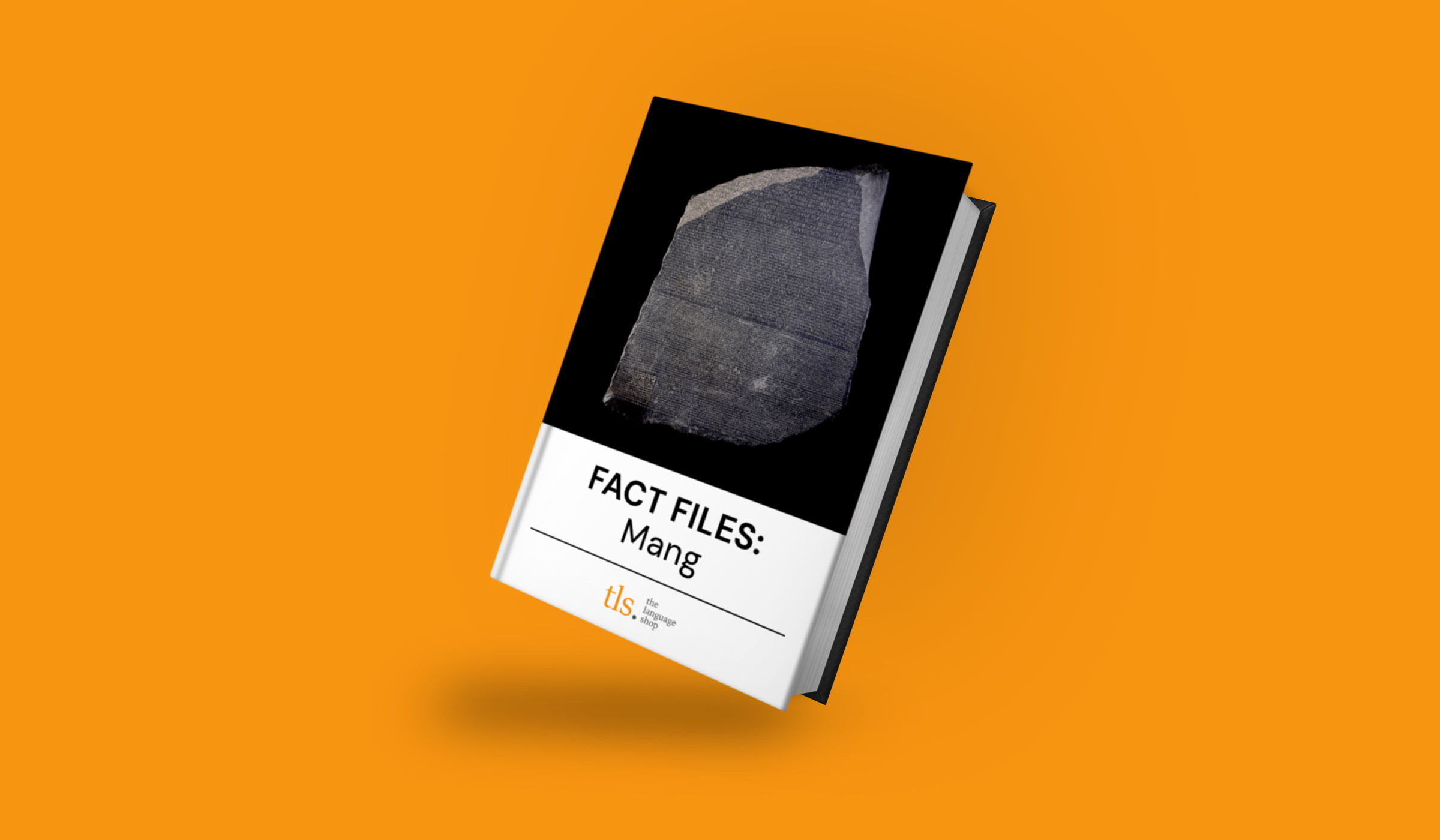
Here at The Language Shop we like to shine a light on some of the rarer languages spoken across the world, many of which have long and fascinating histories. This month we take a closer look at Mang.
Native to: Jinping, on the Chinese border with Vietnam.
Number of native speakers: Approximately 600 (speakers of the Vietnamese variety are greater in number).
Spoken by: The Mang people.
Learn some Mang: If you were to spend time with the Mang people, a useful word to know would be ‘ʑum’ (pronounced ‘zum’), which means ‘water’.
Interesting facts:
- The Mang, meaning 'mountain people', historically lived in the sparsely populated mountainous regions of Honghe and Wenshan, in south-eastern Yunnan, bordering Vietnam.
- In the 1950s, the Chinese government relocated the Mang people from their mountain huts to newly built houses on lower land. This was carried out in the name of improving hygiene.
- Although they have had their way of life substantially altered by this state intervention, they were exempt from the land reforms, which forced many rural Chinese to hand over their land to the state. This has meant that the Mang have been able to continue many of their traditional customs in way that other non-Han Chinese groups have not.
- The closest ethnic relatives of the Mang are the Palaungic people. It is thought both groups may have been part of the same kingdom in ancient times before splitting into two separate groups, which may explain the similarity in their languages.
The Language Shop provides support in any language you may need, including many of the rarer ones. Get in touch with us to find out more.
Keep up to date with all our latest news here and on social media – we are on Facebook, Twitter and LinkedIn.
Meet The Team: Jacky Ashton, Service Coordinator
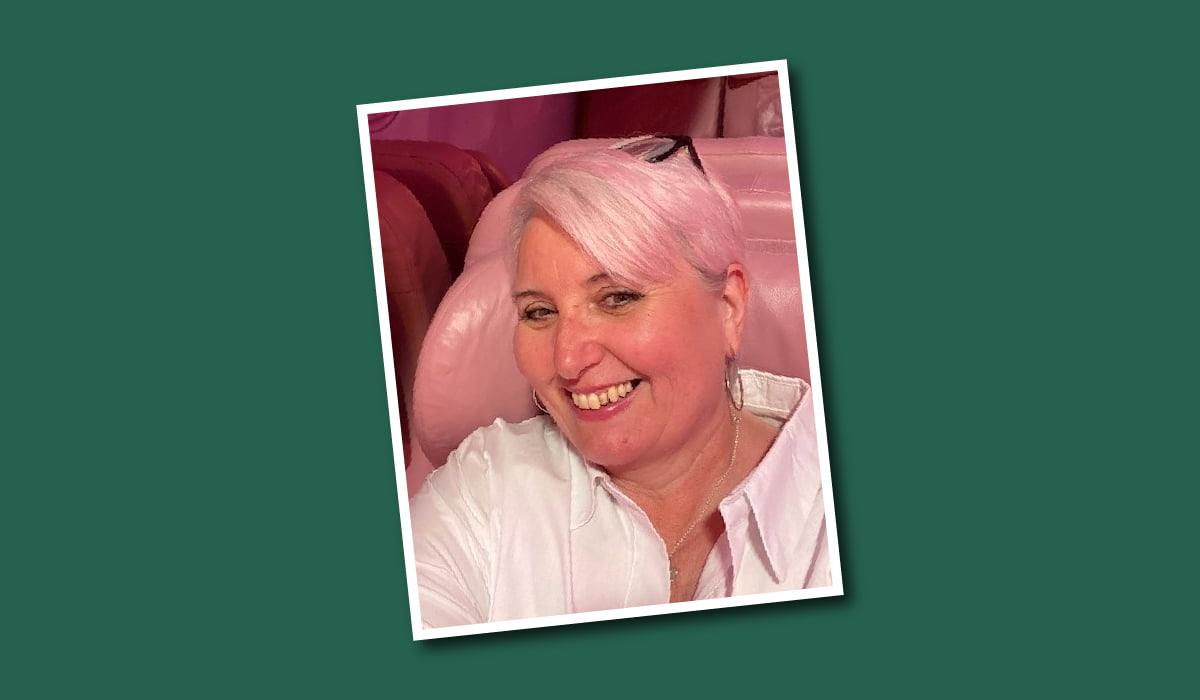
Every month, we introduce you to one of The Language Shop team. This month, meet Jacky Ashton, the Service Coordinator for The Language Shop's on-demand team. Find out more about her official title and personal garden bar!
What’s been your favourite project at TLS?
Being part of the on-demand team since June 2020 when it was a team of five. This has now grown to a team of nine.
What’s been the biggest challenge?
Dealing with the old phone system - most days it was a challenge doing conference calls. It would often take a while to get all parties connected. Thankfully after a lot of hard work from TLS directors and other staff members, this has now been changed and calls run much more smoothly!
If you didn’t do your current job, what would you like to do?
Work in a wedding dress shop or to be a wedding planner.
Tell us something interesting about you
I have a title! It’s Lady Jacqueline Ashton. My husband purchased a title for us both a few years back. We own a very small plot of land in Scotland. It’s about the size of a carpet tile! The certificate that came with the title does say we can change our names on passports etc. to Lady/Lord and maybe get free upgrades on flights etc. We’ve not tried this out yet though. However it does not allow us entry to the House of Lords, nor is it transferrable to our children.
I also love the colour pink. When we moved to our house, my husband built me my own garden bar, which is called Jax Quarry Bar, as our address is on Quarry Road.
If you could meet anyone, living or dead, who would it be and why?
It has to be Princess Diana, just to tell her what an amazing human being she was and to ask for her thoughts on the current world situation.
What are your ambitions for the coming year?
Work wise to carry on providing excellent customer service for TLS. Leisure wise to sign up for dance lessons with my husband.
Say hello to Jacky on The Language Shop’s social media – we are on Facebook, Twitter and LinkedIn. Keep up to date with all our latest news here.
Rare language fact file: Seke

Here at The Language Shop we like to shine a light on some of the rarer languages spoken across the world, many of which have long and fascinating histories. This month we take a closer look at Seke.
Fact file
Native to: Mustang, Nepal
Number of native speakers: Approximately 700.
Spoken by: Inhabitants of five villages: Chuksang, Chaile, Gyakar, Tangbe, and Tetang – and approximately 100 people in Brooklyn, NYC!
Learn some U’wa: ‘Ca garawa mu’ translates as ‘that’s good’, which can be used in lots of different contexts!
Interesting facts:
- ‘Seke’ means ‘golden language’ and the region in Nepal it is from, Mustang, means ‘plain of aspiration’ in Tibetan languages.
- As with many endangered languages, Seke is dying out because young people in the area are educated in Nepali or Hindi, and TV is mainly in Hindi. In addition to this, Nepali is considered crucial for making progress in education or the jobs market, so speaking Seke is not generally encouraged.
- Seke’s fortunes have been revived a little by a movement in Nepal to preserve it, and by the thriving community of diasporic Seke speakers in Brooklyn, New York. Of the 100 speakers there, approximately half live in the same building! This unusual enclave has brought the Seke language some attention, and the Endangered Language Alliance is working with one of the older inhabitants to produce a Seke dictionary.
The Language Shop provides support in any language you may need, including many of the rarer ones. Get in touch with us to find out more.
Keep up to date with all our latest news here and on social media – we are on Facebook, Twitter and LinkedIn.
Meet the Team: Naveeda Mahmood, Intepreter

Every month, we introduce you to one of The Language Shop team. This month, meet Naveeda Mahmood, one of our interpreters who works in Punjabi, Urdu, Hindi and English. Find out about how she got to grips with Zoom over lockdown and her passion for baking!
What’s been your favourite project at tls?
As an interpreter I enjoy interacting with people generally, but on a personal level I have learnt tremendously from the talking therapies and physiotherapy.
What’s been the biggest challenge?
Covid and all the changes it brought with it. All the technology, like Zoom, was new to me. Working from home, staying put and interacting with people only on the phone was a challenge.
If you didn’t do your current job, what would you like to do?
I would have been a teacher in adult education, teaching either English or cookery (baking preferably).
Tell us something interesting about you
I love baking and trying new recipes. I try new dishes all the time and have taken courses in baking and cake decorating.
If you could meet anyone, living or dead, who would it be and why?
I would love to meet our prophet Muhammad (PBUH). He was the perfect human being, he preached Allah's message (the Quran) to humanity. He set an example for us all.
What are your ambitions for 2021?
I would like to complete my Interpreting level 4 course. Also I would like to do a course in cupping.
Say hello to Naveeda on The Language Shop's social media – we are on Facebook, Twitter and LinkedIn. Keep up to date with all our latest news here.





